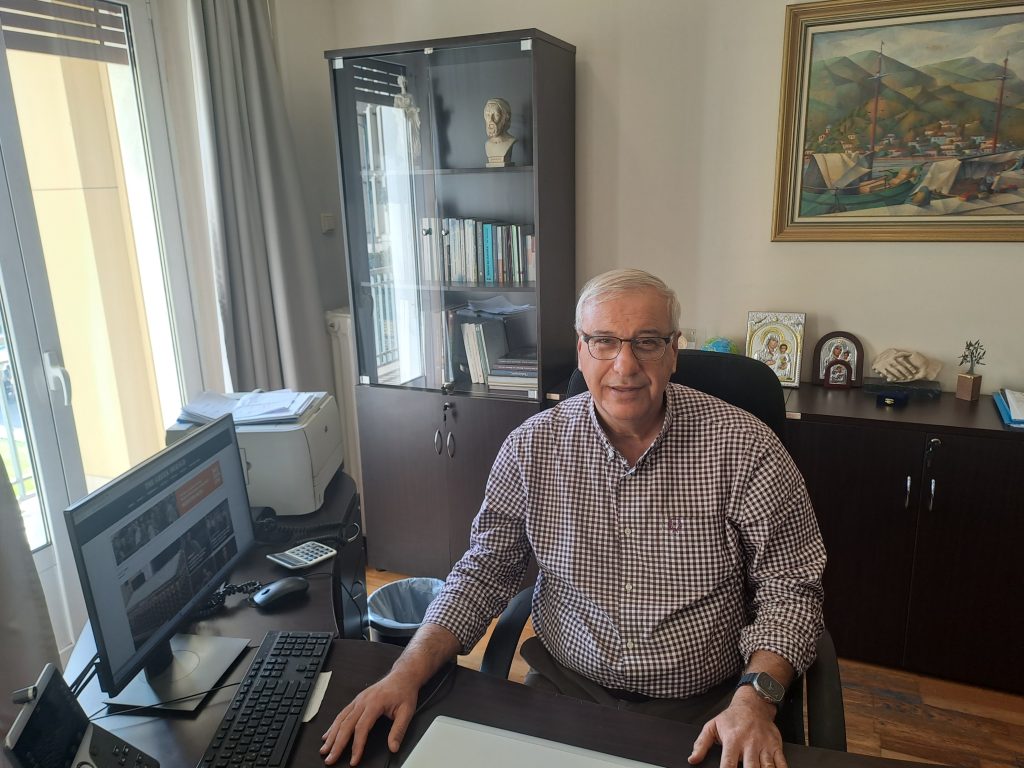By Ilias Karagiannis.
The Secretary General of the Greek Ministry of Interior, Michalis Stavrianoudakis, has urged the Greek expatriates of Australia through The Greek Herald to register on the platform apodimoi.gov.gr so they have the right to vote in the 2023 national elections.
In his exclusive interview with our newspaper, Mr Stavrianoudakis reveals that to date only 4,000 voters have registered – a number which, he says, is very small.
He argues that in case of re-election of the New Democracy Party, an attempt will be made to improve the law of voting of expatriates, but for this to happen, there must be several more registrations in order to show a tangible interest of the expatriates in the flagship initiative.
With the elections being just around the corner he indirectly but clearly states that the registration of expatriates should be done by mid-February, where he suggests the election will likely be announced.
In fact, through The Greek Herald, Mr Stavrianoudakis called on Greek organisations in Australia to organise a teleconference in order to inform them as best as possible about the law, even in the presence of the Greek Minister of Interior, Makis Voridis.
Escalated efforts to increase diaspora voting:
Mr Stavrianoudakis has served as Mayor of Dafni from 2002 until 2019 when he switched to the Ministry of Interior. He welcomed The Greek Herald to his office at the Ministry of Interior on Stadiou Street in Athens this month and his anxiety about the expatriate vote was evident.

Passionate and knowledgeable, Mr Stavrianoudakis wanted to deconstruct myths surrounding this emblematic effort for the vote of expatriates brought to Parliament by the New Democracy government in 2019.
“We escalated our efforts to register more expatriate Greeks on the platform in the last quarter. We are now entering the pre-election period. Elections will be held in 2023. Now, whether these are done in March, April, or May does not matter. Time is running out and the next four months will be very important,” Mr Stavrianoudakis said.
“The platform, which has been open for four to five months, has collected few registrations and this is despite hundreds of thousands visiting it. Maybe a million, but it’s a number that needs confirmation.
“As we speak, applications for registration do not exceed 4000.
“This is because, firstly, several expats never learned about the platform and secondly, some felt that they did not meet the criteria and as a result they did not get involved.

“Our goal when we went to the Greek Parliament in 2019 was simple. Those who were registered on the electoral rolls to obtain the right to vote from their place of residence must have submitted a tax return. Most of them do because they have real estate in Greece, for example.
“This was not accepted mainly by the Left in Greece. This reform required 200 votes in the Greek Parliament to become state law. Unfortunately, it did not meet the criteria we wanted.
“A second problem was that many did not believe they met the criteria. However, as I mentioned in my recent visit to America to the expatriates there, not everyone may have the right to vote, but there are many who have.
“It is certainly not hundreds of thousands of potential voters but it is not only the 4,000 who finally signed up.”
The need for instant registration:
The Greeks abroad who have resided for two years within Greece in the last 35 years and have submitted a tax return in the current or previous tax year, have the right to register in the electoral rolls.
The Ministry of Interior has been trying in recent weeks, however, to escalate the information within the expatriates to increase registrations.

“We ran a campaign last summer to find out the criteria. I don’t know what impact it had after all. We heard some expatriates complain that they did not hear about the campaign, which I consider unlikely, since the campaign ran in all the expatriate media in the world,” Mr Stavrianoudakis said.
“About two weeks ago we held a teleconference with 25 Federations of expatriates in America in the presence of the Minister Mr Voridis. From the aftermath of this teleconference, I can say that it turned out to be very successful.
“Some even jokingly mentioned that not so many people had gathered together before. In New York, I held a meeting with the Archbishop Irineos and there will be an attempt to activate potential voters in the churches of America as well. A similar campaign will take place in Europe, where many younger people have fled because of the crisis.
“I pointed out to them a risk that exists if not immediately registered. The Greeks leave everything to the last minute but I want to point out that after the elections are called, a complete processing of the data will be practically impossible, so the beneficiaries will have to move immediately.
“In November, I had been to America and I told expats that you have time to register in November, December, January and maybe February. I don’t know when the election will be called, of course, but it won’t be easy to process a voter’s data at the last minute.
“The validity of the law provides for up to three days from the announcement of the elections. This, however, is practically very difficult. Let me say something else here as an example: If a Greek Australian decides to register on February 26, and elections are called on the 28, he is not listed for the first election. But he is for the second election- if, of course, they take place.”

The call to Greek organisations in Australia:
The Greek Herald asked Mr Stavrianoudakis if he would be satisfied with having 10,000 people registered on the platform.
“My personal goal is much bigger. If citizens from England, Germany, Italy and Cyprus register, we will have a much higher number on the platform,” he said, while avoiding mentioning a specific number.
A constant demand of the expatriates in Australia, like all expatriates, remains the change of the law and the removal of certain criteria. Mr Stavrianoudakis stressed that participation in the upcoming elections is important since, among other things, it will be a lever of pressure for a possible review of the current legislation.
“I said in my meetings with expats that we don’t have to waste our time saying we disagree on the law,” Mr Stavrianoudakis said.
“But let’s go one step further. If only 3,000 to 4,000 register on the platform, who will go to the next Parliament to say that the expatriates showed interest in Greece? No one. They will tell you for example that 90,000 were entitled to register and only 5,000 registered…

“In case of re-election of the New Democracy Party, we will try 100% to improve this law. But our request will be more enhanced if 40,000 expatriates register on the platform instead of 4,000.
“The participation of those who are currently entitled will also be an incentive for the next Parliament to demand further improvement of the conditions. We cannot sum up how many thousands are eligible to vote from abroad. But surely they are not this few.
“It is very important, through this pool of people, whether they are in Australia, or in America, or in Europe, especially the youth… if there is no interest from them you realise that it will be extremely difficult to come to such a discussion again in the future.”
Concluding this interview, Mr Stavrianoudakis addressed a call to Greek organisations of the Australian community to follow the example of America and organise a teleconference for information on the expatriate vote.
“If there is interest from Australian organisations for an informative teleconference, we are at their disposal. I wish we could go to Australia and have meetings in person, but that’s hard. It would be a pleasure to talk to the expatriates of Australia,” Mr Stavrianoudakis concluded.

